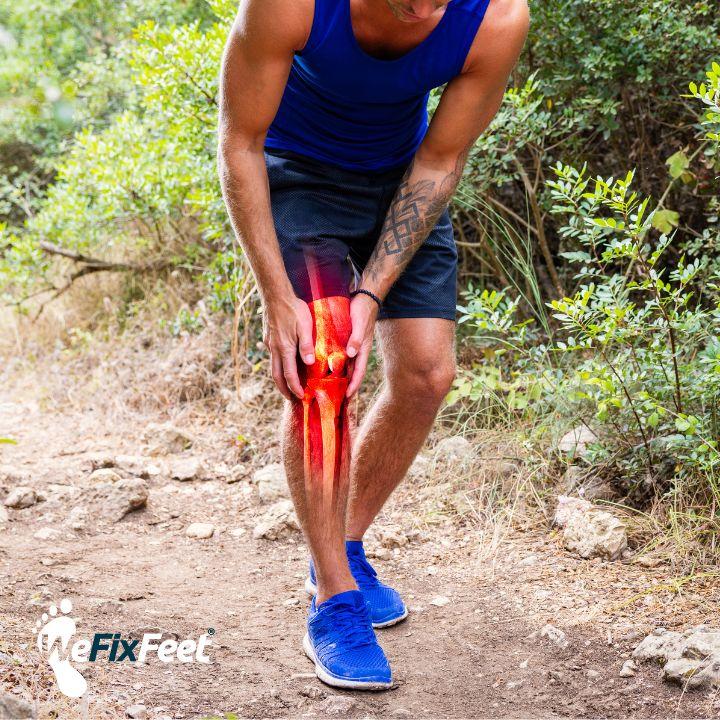
Can Foot Pain Cause Knee Pain? Understanding the Connection and Effective Treatments

Can Foot Pain Cause Knee Pain? Understanding the Connection and Effective Treatments
Foot pain can be a significant issue on its own, but did you know it can also lead to knee pain? Understanding the relationship between foot pain and knee pain can help you address the root cause of your discomfort and find effective treatments to alleviate both.
Foot pain can indeed cause knee pain. This connection stems from the intricate relationship between the structures of the foot and the biomechanics of the lower limb. When something goes wrong with your feet, it can throw off your body's alignment and mechanics, leading to issues elsewhere, particularly in the knees.
One of the primary ways foot pain leads to knee pain is through poor biomechanics. If you have flat feet, high arches, or other structural problems, your gait (the way you walk) can be affected. This altered gait can cause compensatory movements and postures that put extra strain on your knees. Over time, this can lead to chronic knee pain.
Additionally, conditions like plantar fasciitis, Achilles tendinitis, and bunions can change how you walk, causing you to distribute your weight unevenly. This imbalance can travel up your kinetic chain (the interconnected system of bones, muscles, and joints), leading to discomfort in your knees and even your hips and lower back.
Foot pain can also cause knee pain by affecting your posture. If you’re trying to avoid putting pressure on a painful foot, you might shift your weight to the other side or lean forward or backward. These compensatory postures can strain your knee muscles and joints, leading to pain and discomfort.
Causes of Foot Pain Leading to Knee Pain:
Flat Feet:
Flat feet, or fallen arches, can lead to overpronation, where the foot rolls inward excessively. This can cause misalignment in the lower limb and put extra stress on the knee joints.
High Arches:
High arches can lead to supination, where the foot rolls outward. This can also cause misalignment and result in uneven weight distribution, leading to knee pain.
Plantar Fasciitis:
Plantar fasciitis is a condition that causes pain in the heel and arch of the foot. This pain can alter your gait, causing you to shift your weight and put extra strain on your knees.
Achilles Tendinitis:
Inflammation of the Achilles tendon can affect your ankle mobility and lead to compensatory movements that strain the knees.
Bunions:
Bunions are bony bumps that form on the joint at the base of the big toe. They can cause pain and discomfort, leading to altered walking patterns that impact the knees.
Injuries:
Foot injuries, such as fractures or sprains, can cause you to change how you walk to avoid pain, leading to knee problems.
Effective Treatments:
Managing foot-related knee pain involves addressing both the foot issues and the resultant knee discomfort. Here are some effective treatments to consider:
1. Footwear Modifications:
Proper footwear is crucial for maintaining foot health and preventing knee pain. Invest in shoes with good arch support, cushioning, and a proper fit. Avoid high heels and shoes with narrow toe boxes. Custom orthotics can also provide additional support and correct alignment issues.
2. Gait Analysis and Correction:
A gait analysis can help identify abnormal walking patterns contributing to knee pain. A podiatrist or physiotherapist can recommend exercises and techniques to correct your gait and reduce strain on your knees.
3. Foot and Knee Strengthening Exercises:
Strengthening the muscles in your feet, legs, and knees can improve stability and reduce pain. Exercises like calf raises, toe curls, leg lifts, and squats can help build strength and support proper alignment.
4. Manual Therapy:
Manual therapy, including joint mobilisation and manipulation, can help improve joint function and reduce pain. A trained therapist can work on your foot and knee joints to enhance mobility and alleviate discomfort.
5. Proprioceptive Training:
Proprioception refers to your body's ability to sense its position and movement. Proprioceptive training involves exercises that improve balance and coordination, helping to prevent injuries and reduce pain. Balance boards and stability exercises are great options.
6. Acupuncture:
Acupuncture involves inserting thin needles into specific points on the body to relieve pain and promote healing. It can be effective for managing both foot and knee pain by reducing inflammation and improving blood flow.
7. Cryotherapy:
Cryotherapy, or cold therapy, involves exposing the body to extremely cold temperatures for short periods. It can help reduce inflammation and pain in both the foot and knee. Localised cryotherapy, such as ice packs, can also be effective.
8. Yoga and Stretching:
Regular stretching and yoga can improve flexibility, strengthen muscles, and promote relaxation. Poses that target the feet, calves, and legs can help alleviate pain and prevent further issues. Focus on stretches like the downward-facing dog, calf stretches, and hamstring stretches.
Preventing Foot and Knee Pain:
Preventing foot and knee pain involves taking proactive steps to maintain overall health and protect your lower limbs. Here are some tips to keep in mind:
Choose the Right Shoes: Ensure your shoes fit well and provide adequate support. Avoid high heels and shoes with narrow toe boxes.
Maintain a Healthy Weight: Excess weight can put additional stress on your feet and knees, leading to pain and discomfort.
Stay Active: Regular exercise helps keep the muscles in your feet, legs, and knees strong and flexible. However, be sure to include low-impact activities to avoid overuse injuries.
Practice Good Foot Hygiene: Keep your feet clean and dry to prevent infections. Trim your toenails regularly and moisturise your feet to keep the skin healthy.
Listen to Your Body: Pay attention to any signs of foot or knee pain and address them promptly. Ignoring pain can lead to more serious issues over time.
Understanding the connection between foot pain and knee pain is the first step towards finding effective relief. By addressing the root cause of your pain and seeking professional treatment, you can improve your overall health and well-being.
If you’re struggling with foot or knee pain and need professional advice, contact We Fix Feet for a comprehensive evaluation and personalised treatment plan. Book an appointment online or call us at 0115 9328832 to start your journey towards pain-free living and optimal foot and knee health.
Ask The We Fix Feet Team
Fill in the form to request a Call From Our Team
One of our team will call you for FREE and answer any questions or concerns you may have about your uncomfortable foot condition

Where To Find We Fix Feet
Our We Fix Feet podiatry clinics are conveniently located in Ilkeston, Derbyshire and Beeston, Nottinghamshire
Open: Mon-Fri 09:00-17:00 / Sat 09:00-13:00
94 Bath Street, Ilkeston, Derbyshire DE7 8FE
8 Wollaton Road, Beeston, Nottinghamshire NG9 2NR
Pay and display parking nearby




